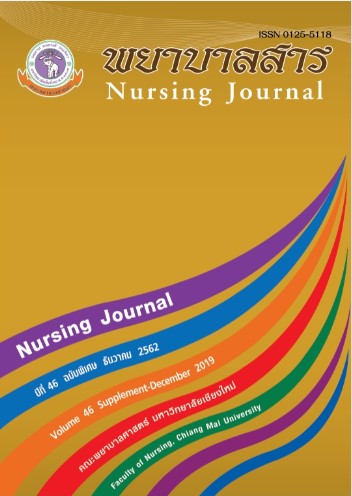Grounded Theory Study in Nursing Research
Keywords:
Grounded Theory, Nursing Research, Symbolic interactionism, Substantive TheoryAbstract
Grounded Theory is a type of qualitative research methodology used to develop or create the theory from the research process by the inductive method, which is the conclusion of the data from the study phenomenon by gathering and analyzing systematically. The development of the theory by this method is based on Symbolic Interactionism, a conceptual framework that studies social processes that interact with each other. The grounded theory process uses a method of collecting qualitative research data and analyzing the data simultaneously by providing coding to categorize the data. Finding the meaning of the relationship between the properties and dimensions to obtain the core category of the phenomena that need to be studied and make comparative analysis between data collected from the fieldwork and the literature review by constant comparison method. After that, select the core category that can explain the phenomenon that researchers want to study. Then define relationships with other categories to develop a rational relationship model or a diagram of the theory.The results obtained from the research using the grounded theory from the basic data will create a substantive theory and can be developed as a formal theory.
Grounded Theory is used in nursing research because that can explain human behavior and social contexts. It can be applied to various issues relating to nursing phenomena.
References
study of the intention of nurses to leave the profession. Rev. Latino-Am. Enfermagem, 25,
1-9. DOI: 10.1590/1518-8345.1638.2894.
Brown, S.C., Stevens, R. A., Troiano, P. F., & Schneider, M.K. (2002). Exploring Complex
Phenomenon: Grounded Theory in Student Affairs Research. Journal of College Student
Development, 43(2), 1-11.
Carcary, M. (2009). The Research Audit Trial – Enhancing Trustworthiness in Qualitative Inquiry.
The Electronic Journal of Business Research Methods, 7(1), 11 - 24.
Charmaz, K. (2014). Constructing grounded theory: a practical guide through qualitative
analysis. London: SAGE.
Corbin, J., & Strauss, A. (2008). Basics of qualitative research (3rd ed.). Los Angeles, CA: SAGE.
Cooney, A. (2010). Rigor and Grounded Theory. Nurse Researcher, 14(4), 17 - 22.
Glaser, B., & Strauss, A. L. (1967). The Discovery of Grounded Theory: Strategies for Qualitative
Research. Chicago: Aldine Publishing Company.
Glaser, B. (1978). Theoretical sensitivity. Mill Valley, CA: Sociology Press.
Glaser, B. G. (1992). Emergence vs. forcing: Basics of grounded theory analysis. Mill Valley,
CA: Sociology Press.
Glaser, B.G. (1998). Doing grounded theory:Issues and discussions. Mill Valley, CA:Sociology
Press.
Hoda, R., Noble. J., & Marshall. S. (2011). Developing a grounded theory to explain the practices
of self-organizing Agile team. Empirical Softw Eng. Published online: 15 April 2011.
Hollaway, I., & Galvin, K. (2017). Qualitative research in nursing and healthcare. (4th ed.). Iowa:
Blackwell Publishing.
Holloway, I., & Todres, L. (2010). Grounded theory. In Gerrish, K. Lacey, A. (Eds) The Research
Process in Nursing. (6th ed). Oxford: Wiley Blackwell, 153-164.
Kenny, M., & Fourie, R. (2014). Tracing the history of grounded theory methodology: From
formation to fragmentation. The Qualitative Report, 19, 1–9.
Klunklin, A. & Greenwood, J. (2006). Symbolic interactionism in grounded theory studies: women
surviving with HIV/AIDS in rural northern Thailand. JANAC, 17(5), 32-41.
McCann, T.V., & Clark, E. (2003). Grounded theory in nursing research: Part1-Methodology. Nurse
Research, 11(2), 7-18.
Mediani, H.S. (2017). An Introduction to Classical Grounded Theory. SOJ Nur Health Care 3(3):1-5.
Morrow, S. L. (2005). Quality and Trustworthiness in Qualitative Research in Counseling
Psychology. Journal of Counselling Psychology, 25(2), 250 - 260.
Rieger, L. K., Chernomas, M. W., & McMillan, E. D., Morin, L. F. (2019). The arts as a catalyst for
learning with undergraduate nursing students: findings from a constructivist grounded
theory study. Arts & Health, 1-21. DOI: 10.1080/17533015.2019.1608569
Sansiriphun, N., Baosoung, C., Klunklin, A., Kantaruksa, K., Liamtrirat, S. (2014). Experience of first
time father during labor and delivery period. Nursing Journal, 41(Supple), 143-156. (In Thai)
Strauss, A., & Corbin, J. (1990). Basics of Qualitative Research: Grounded Theory Procedures and
Techniques. Thousand Oaks, CA: SAGE.
Streubert, H.J., & Carpenter, R. D. (2011). Qualitative research in Nursing: Advancing the
Humanistic Imperative. (5th ed.), Philadelphia: Lippincott Williams & Wilkins.
Sikolia, D., Biros, D., Mason, M., & Weiser, M. (2013). Trustworthiness of Grounded Theory
Methodology Research In Information System. MWAIS 2013 Procedding,16, 6.
Downloads
Published
How to Cite
Issue
Section
License
บทความที่ได้รับการตีพิมพ์เป็นลิขสิทธิ์ของวารสารพยาบาลสาร
ข้อความที่ปรากฏในบทความแต่ละเรื่องในวารสารวิชาการเล่มนี้เป็นความคิดเห็นส่วนตัวของผู้เขียนแต่ละท่านไม่เกี่ยวข้องกับมหาวิทยาลัยเชียงใหม่ และคณาจารย์ท่านอื่นๆในมหาวิทยาลัยฯ แต่อย่างใด ความรับผิดชอบองค์ประกอบทั้งหมดของบทความแต่ละเรื่องเป็นของผู้เขียนแต่ละท่าน หากมีความผิดพลาดใด ๆ ผู้เขียนแต่ละท่านจะรับผิดชอบบทความของตนเองแต่ผู้เดียว






